B-hBCMA MC38
|
Common name |
B-hBCMA MC38 | Catalog number | 310720 |
| Aliases |
BCM, BCMA, CD269, TNFRSF13A |
Disease | Colon carcinoma |
|
Organism |
Mouse |
Strain | C57BL/6 |
| Tissue types | Colon | Tissue | Colon |
- Origin: The MC38 cell line is derived from C57BL/6 murine colon adenocarcinoma cells. The cell line is a commonly used murine model for colorectal carcinoma.
- Background Information: BCMA, also known as TNFRSF17, plays a major role in the maturation and differentiation of B cells into plasma cells. Under physiological conditions, BCMA is mainly expressed on plasma cell precursors and terminally differentiated plasma cells. In pathological situations, BCMA is expressed in almost all cases of multiple myeloma (MM), making it one of the star targets for MM drug development. Various BCMA-targeted drugs including antibody-drug conjugates (ADCs), chimeric antigen receptor T-cell therapies (CAR-T) and bispecific T-cell engagers (BiTEs) are currently under active clinical development.
- Gene targeting strategy: The exogenous promoter and human BCMA coding sequence were inserted into the mouse ROSA26 locus of wild MC38 cell lines.
- Tumorigenicity: Confirmed in C57BL/6 mice, B-h4-1BB mice, B-hCD3E mice.
- Application: The B-hBCMA MC38 tumor models can be used for preclinical evaluation of monoclonal antibody drugs and bispecific antibody drugs targeting human BCMA.
- Notes:
- B-hBCMA MC38 cell line contains G418 resistance gene. After the cells have grown stably, 1000μg/mL of G418 needs to be added to maintain cell growth.
- It is recommended to choose anti-human BCMA antibodies with good specificity for protein expression analysis, such as Belantamab analog.
Targeting strategy
Gene targeting strategy for B-hBCMA MC38 cells. The exogenous promoter and human BCMA coding sequence were inserted into the mouse ROSA26 locus of wild MC38 cell lines.
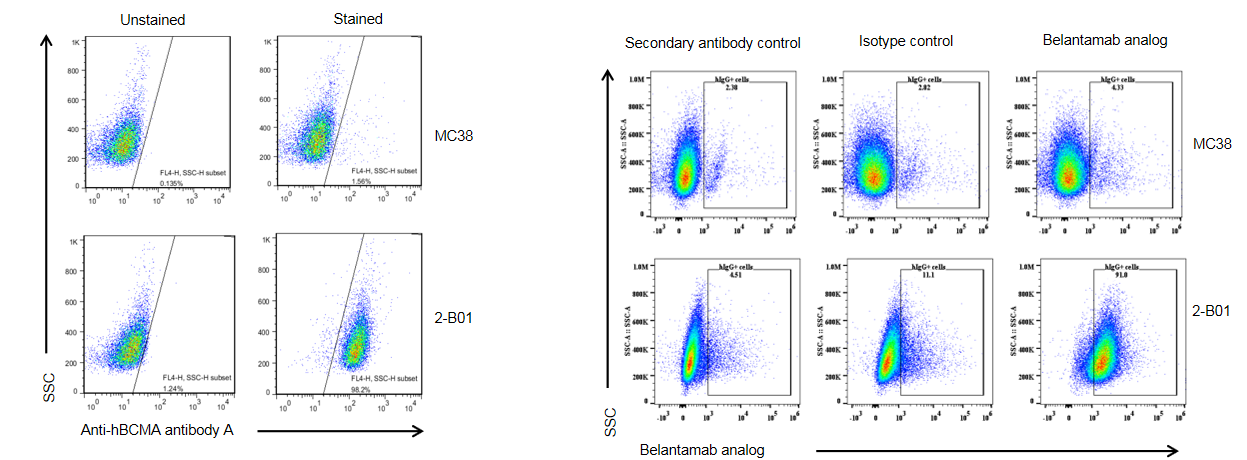
BCMA expression analysis in B-hBCMA MC38 cells by flow cytometry. Single cell suspensions from wild-type MC38 and B-hBCMA MC38 cultures were stained with species-specific anti-BCMA antibody A (provide a client) and Belantamab analog (in house). Human BCMA was detected on the surface of B-hBCMA MC38 cells but not wild-type MC38 cells. The 2-B01 clone of B-hBCMA MC38 cells was used for in vivo experiments.
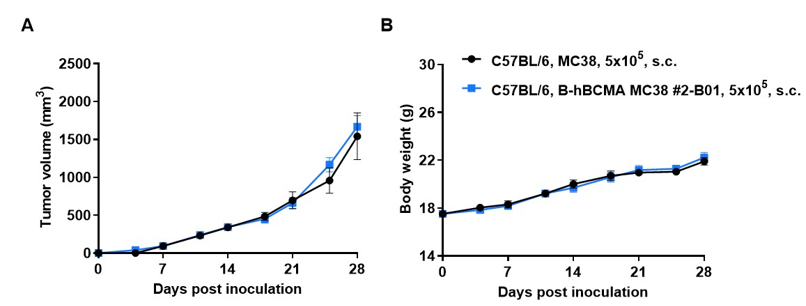
Subcutaneous homograft tumor growth of B-hBCMA MC38 cells. B-hBCMA MC38 cells (5x105) and wild-type MC38 cells (5x105) were subcutaneously implanted into C57BL/6 mice (female, 5-8-week-old, n=5). Tumor volume and body weight were measured twice a week. (A) Average tumor volume ± SEM. (B) Body weight (Mean± SEM). Volume was expressed in mm3 using the formula: V=0.5 X long diameter X short diameter2. As shown in panel A, B-hBCMA MC38 cells were able to establish tumors in vivo and can be used for efficacy studies.
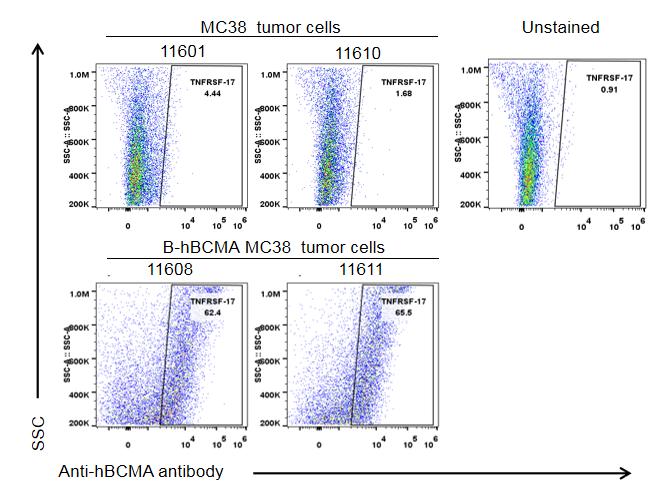
BCMA expression evaluated on B-hBCMA MC38 tumor cells by flow cytometry. B-hBCMA MC38 cells were subcutaneously transplanted into C57BL/6 mice (n=5), and on 36 days post inoculation, tumor cells were harvested and assessed for human BCMA expression by flow cytometry using anti-human BCMA antibody A (provide a client). As shown, human BCMA was expressed on the surface of tumor cells. Therefore, B-hBCMA MC38 cells can be used for in vivo efficacy studies of novel BCMA therapeutics.

Subcutaneous homograft tumor growth of B-hBCMA MC38 cells. B-hBCMA MC38 cells (5x105, 5x106) and wild-type MC38 cells (5x105) were subcutaneously implanted into B-h4-1BB mice (female, 7-week-old, n=6). Tumor volume and body weight were measured twice a week. (A) Average tumor volume. (B) Body weight. Volume was expressed in mm3 using the formula: V=0.5 X long diameter X short diameter2. As shown in panel A, B-hBCMA MC38 cells were able to establish tumors in vivo and can be used for efficacy studies. Values are expressed as mean ± SEM.
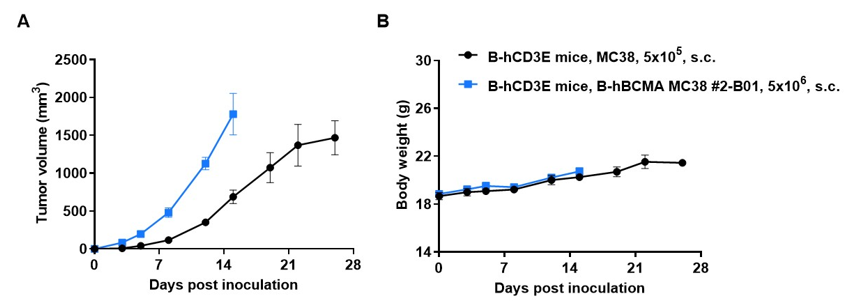
Subcutaneous tumor growth of B-hBCMA MC38 cells. B-hBCMA MC38 cells (5x106) and wild-type MC38 cells (5x105) were subcutaneously implanted into B-hCD3E mice (female, 6-8-week-old, n=6). Tumor volume and body weight were measured twice a week. (A) Average tumor volume. (B) Body weight. Volume was expressed in mm3 using the formula: V=0.5 X long diameter X short diameter2. Results indicate that B-hBCMA MC38 cells were able to establish tumors in vivo and can be used for efficacy studies. Values are expressed as mean ± SEM.
Protein expression analysis of tumor tissue
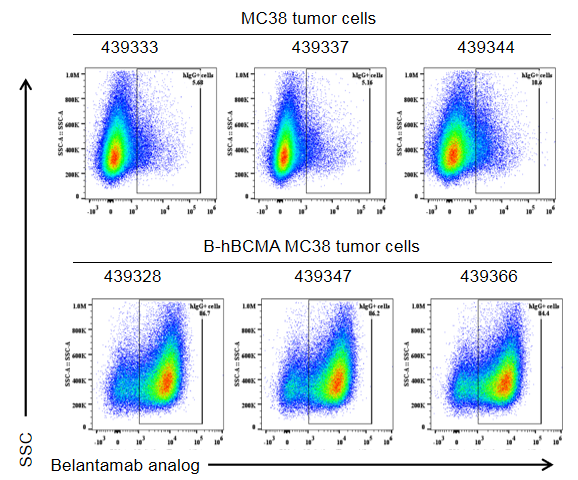
BCMA expression evaluated on B-hBCMA MC38 tumor cells by flow cytometry. B-hBCMA MC38 cells were subcutaneously transplanted into B-hCD3E mice (n=6). Upon conclusion of the experiment, tumor cells were harvested and assessed for human BCMA expression by flow cytometry using anti-human BCMA antibody Belantamab analog (in house). As shown, human BCMA was highly expressed on the surface of tumor cells. Therefore, B-hBCMA MC38 cells can be used for in vivo efficacy studies evaluating novel BCMA therapeutics.










